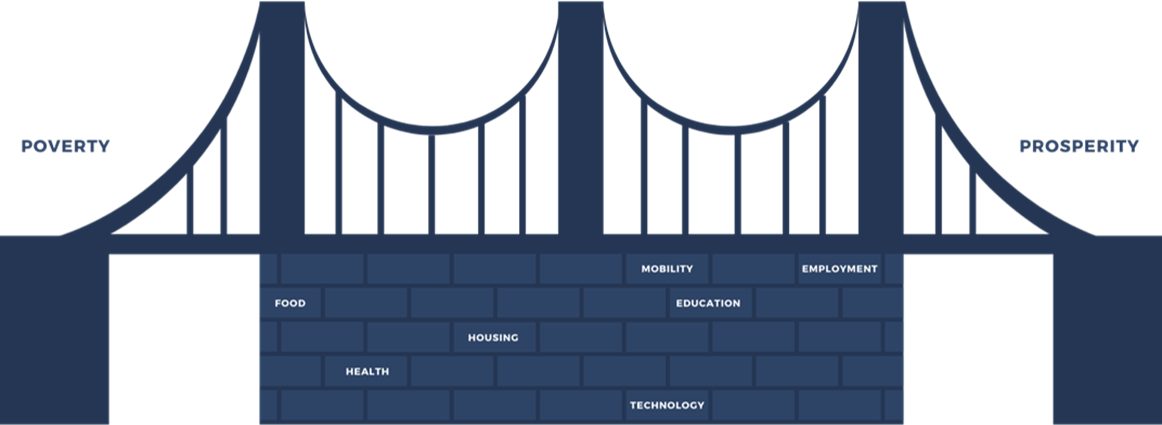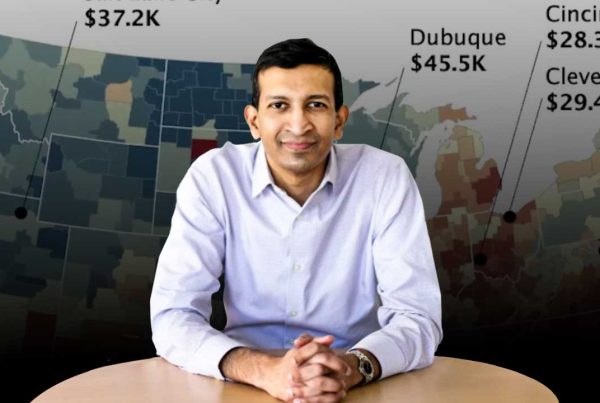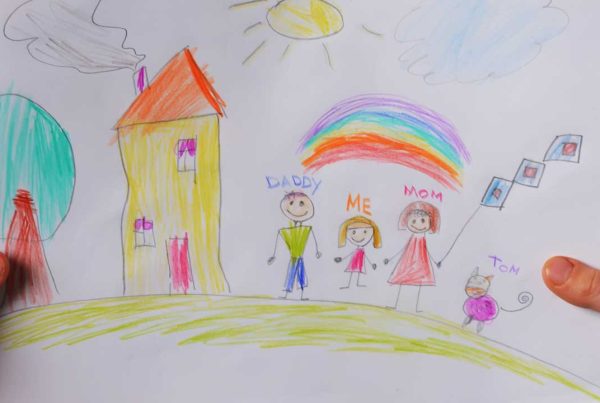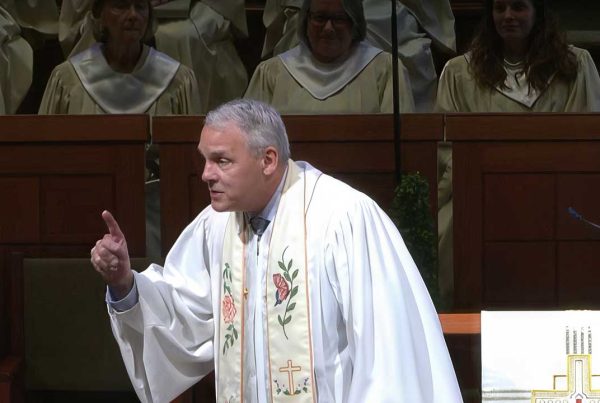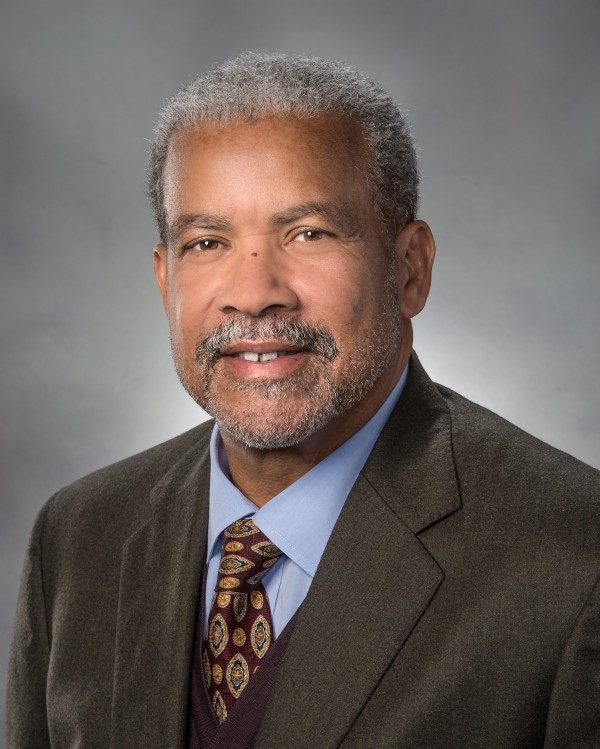 A longtime community leader and advocate who serves as a senior policy advisor for Bose Public Affairs Group, Sam Odle believes our best chance at overcoming poverty will come from a concerted and coordinated effort to realign our systems to address seven key factors.
A longtime community leader and advocate who serves as a senior policy advisor for Bose Public Affairs Group, Sam Odle believes our best chance at overcoming poverty will come from a concerted and coordinated effort to realign our systems to address seven key factors.
Sam’s perspective is informed by experience. Prior to joining Bose, Sam served as the COO of IU Health and as CEO of both Methodist Hospital and University Hospital, and he has long been involved in social and community leadership in Central Indiana. A Faith & Action Advisory Board Member since 2015, Sam often has been recognized for his service, including being named the 2011 recipient of the Greater Indianapolis Progress Committee “Charles L. Whistler Award” for visionary and enthusiastic leadership and success in bringing together the public and private sectors for civic improvement.
Following is a call to action Sam recently put before the city’s leaders.
One of the most difficult problems in Marion County is the number of households and people who live in or near poverty (a population known as “ALICE” – Asset Limited, Income Constrained, Employed). Although we have spent countless millions of dollars on assistance and programs, more individuals live in or near poverty today than 30 years ago. The problem is so big that it reduces the quality of life not just for those in poverty but for all citizens and taxpayers.
Multi-generational poverty leaves many of our fellow citizens in a state of hopelessness, facing the truth that they will never live the life that we who are blessed take for granted. It’s not that bad things don’t happen to people who are not poor; they just don’t happen at the same high rate, and this ongoing state of hopelessness leads to risky and antisocial behaviors: gun violence, crime, drug abuse, risky promiscuity, low academic attainment and chronic unemployment, to name just a few.
The services we provide to people in or near poverty are well intended but often uncoordinated and hard to access in a reliable and ongoing way. The result is a disjointed system that seems geared more to keeping people comfortable in poverty rather than getting them out of poverty. If we truly want to see a long-term reduction in the number of households and individuals living in poverty, we must realign our systems to provide the seven key elements every household or individual needs to thrive in the American system of capitalism and democracy.
One: Housing
Safe affordable housing is the foundation of success. We must assure that people have the opportunity for safe affordable housing that does not consume more than 25 percent of their available income. If a household is paying 50 percent or more of their available income just for housing (many times not of high quality and safe), they are trapped in poverty. They do not have enough resources to purchase legitimately everything needed to sustain a person or household. Other supports go wasted if a person does not have safe housing; in fact, those supports often simply serve to make the recipient comfortable in his or her plight.
Two: Nutrition
Humans must be fed. To achieve our best, we need regular meals, preferably healthy food. When meals are not reliable and quality is not available, poor eating habits prevail. Although our efforts to give away more food to those in need each year are laudable, we fail to address the fact that too many household do not have reliable, affordable nutrition. Health statistics bear this out. For example, one the many causes of obesity is not knowing when you will to eat again, and selecting junk food is often the result of living in a food desert, with no access to a full-service grocery with quality food choices.
Three: Livable Income
A person or household must have a minimum level of financial resources. Whether through a minimum wage or some other financial support, we must provide an adequate amount of resources to households for them to have hope of participating in the economy and having access to transportation, internet access and other essentials.
Four: Health
Available basic healthcare is essential to being an active participant in society and the economy. We have good hospitals for serious injury and illness, so we don’t have people dying on the street from heart attacks or car wrecks; however, many people live without basic primary care, mental health support, annual screenings and access to prescription medicines. They lack reliable access to insulin, blood pressure medicine, mental health meds, asthma medications and more, so chronic illnesses are not well managed in the population constrained by financial resources. And the impact becomes increasingly expensive.
Five: Social Capital
Life happens. We all hit bumps in the road. When this happens, most of us turn to family or friends to share our issues, and they typically lift us up and remind us that better days are coming. This is social capital – having reliable access to positive role models, people who give you hope for the future even in the darkest times. For those trapped in poverty or living limited-resource lives, that hopeful encouragement often is simply not there. They live in an environment where all have lost hope. Many children growing up in poverty never see the adult they want to grow up to be like. We have many programs to help through faith communities, not for profits and others, but supports are not consistently available to all who need them.
Six: Civic Awareness
Civic awareness, the belief and understanding that each of us belongs to a community larger than ourselves, urges us to act in the best interests of the larger community. It’s an acknowledgement and understanding that community rules and standards make our community a better place to live and thrive. With fewer and fewer people belonging to faith communities and a lack of civics instruction in schools, we as a community have to ask ourselves how can we best impart common values and civic awareness in a way that lifts up those with limited resources.
Seven. Education
Lifelong access to quality education is essential to leading a successful life in Marion County or anywhere else.
- This begins with access to quality preschool and kindergarten programs, which should be available to all and affordable based on income.
- Second, we need quality K-14 free education for all students. I say “14” because a high school education – ending at “12” – is not sufficient today. Students need to attain an education that makes them ready for employment, ongoing college education, or the service of their choosing.
- Third, we need lifelong learning. Access to ongoing training so that, as jobs are automated and eliminated, adults always can gain new skills for the changing economy. Employers and government should unite to ensure these types of programs are rewarded and employees get incentives to use them. Avoiding obsolescence keeps people from slipping from prosperity into poverty.
As a community, we provide some of these components to our neighbors who are economically challenged, but we don’t do it consistently and with fidelity. They must all be provided together, not piecemeal. When we break them up or don’t provide them as a package of support, we provide only comfort rather than a path out of poverty. It is sad, but not providing the full package actually wastes valuable community resources. That is why we have spent millions but the problem of poverty – and its spin-off problems of violent crime and substance abuse – grows.
I call on our elected leaders to convene the BIG table and organize a Super Bowl-style effort to provide these seven supports in a consistent manner so that, for the next generation, poverty is a rare instance in Marion County.
Sincerely,
Samuel L. Odle
Learn more about the Faith & Action Project at CTS here.

